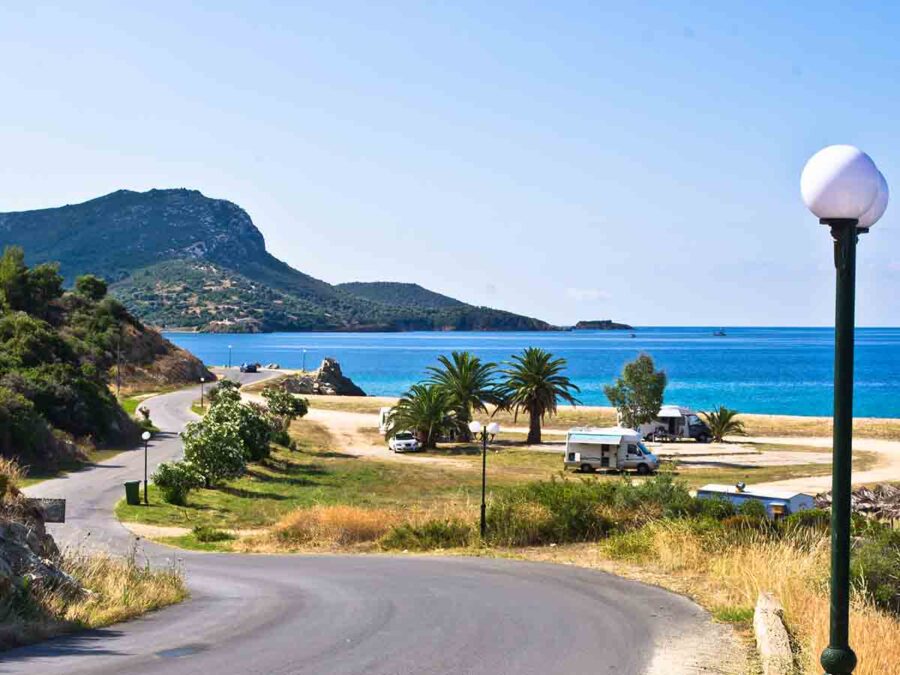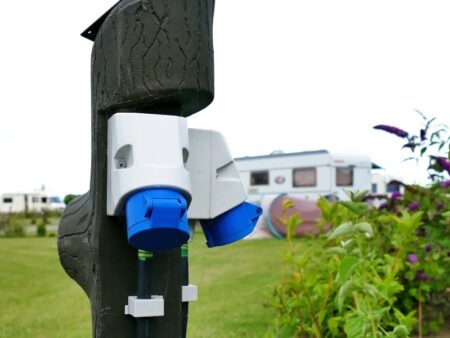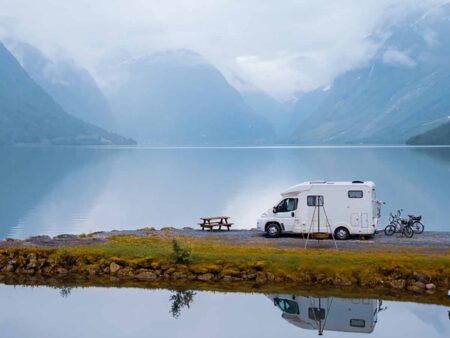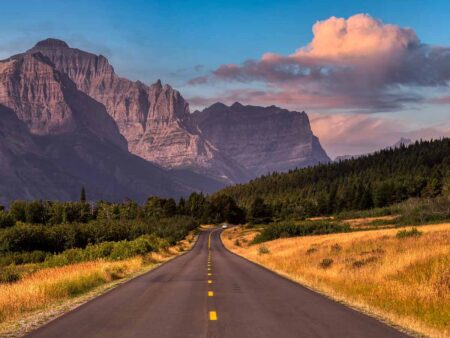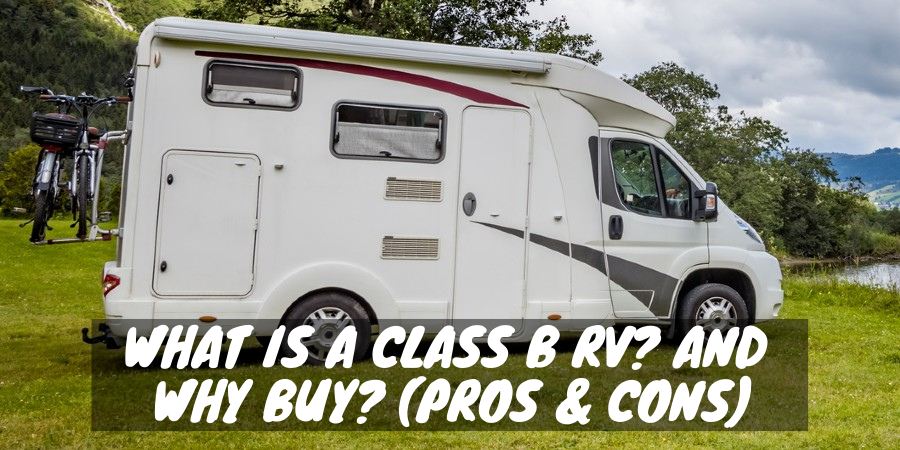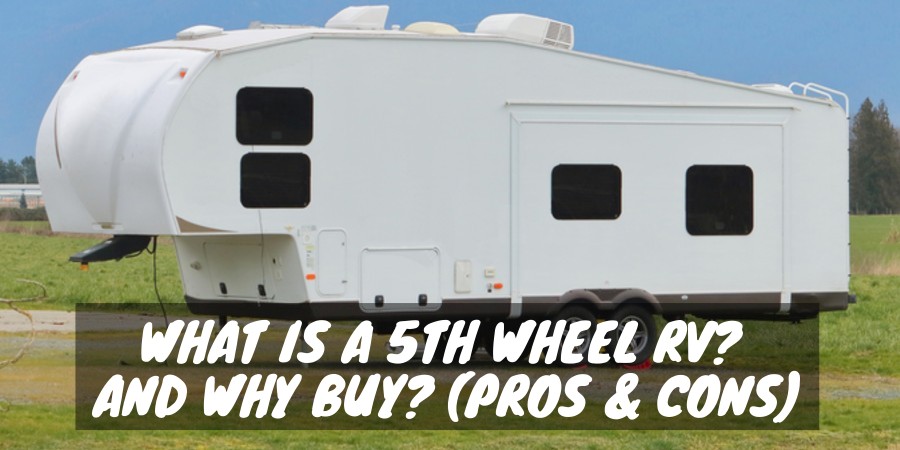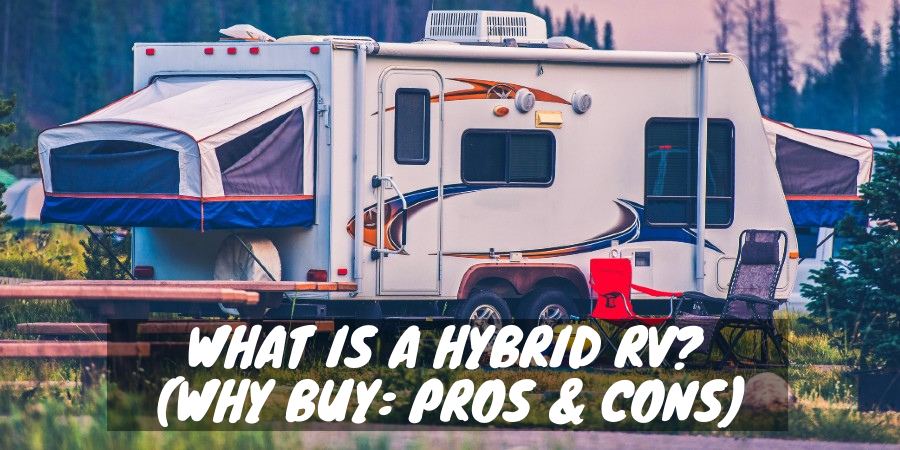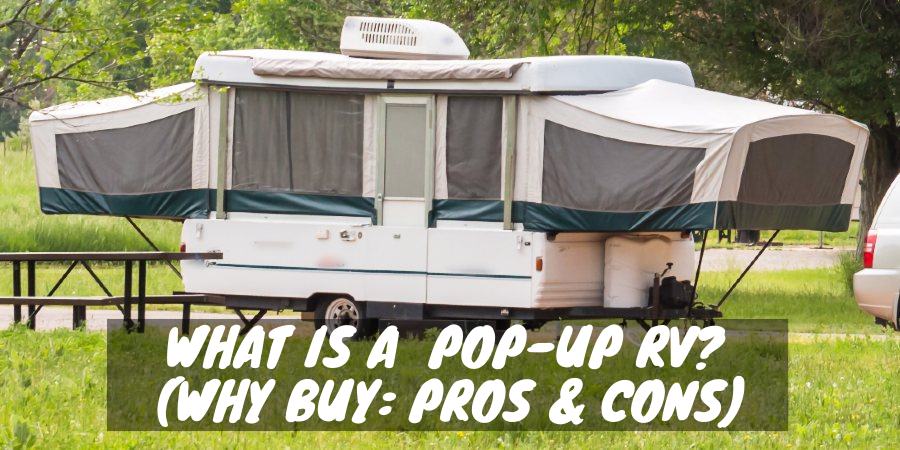Beach camping can be an ideal summertime activity, but what is it exactly, and how is it different from staying at an RV park or campground? For us, beach camping means parking your camper where you have direct access to the sand and sea. You can watch sunrises and sunsets with no buildings in the way, you can sleep to the gentle sounds of crashing waves, and breathe in the refreshing salty air.
While some private campgrounds have access to US beaches, many who advertise as being near the beach can be a frustrating 20 miles away!
To discover what beach camping really means, learn how you can prepare for a trip, and find the best beach camping locations, stay right here. We give you all the insider information to see for yourself why beach camping is a must-do experience!
In Other Words
Beach camping is basically taking a recreational vehicle or tent to a coastal location that allows guests to stay overnight.
Some places will enable you to pull cars or RVs onto the sand, while others require you to park them on designated gravel or paved areas.
Some beach camping locations are remote, such as those on a barrier island, that allow you to escape from your daily life and forget your worries.
Other locations are within easy reach of major cities along the southern, eastern, and western coasts, so you can enjoy solitude and abundant activities if you wish.
Most public beaches do not allow camping, but those that do rarely have any RV-park-style amenities such as water or electricity. Even places that have open bathrooms during the day may lock the facilities at night.
Planning for beach camping takes more thought so you aren’t left in an uncomfortable or even unsafe situation during your stay.
Planning and Packing for a Beach Camping Trip
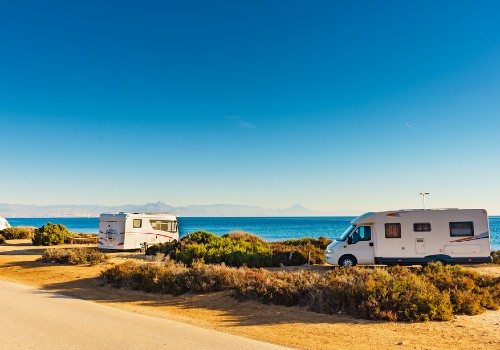
Beach camping will be much like boondocking RV trips or tenting with a pack-it-in and pack-it-out mentality.
You’ll need to have provisions to cover each person per day for:
- Water (drinking and washing)
- Food
- Toiletries (don’t forget the sunscreen and bug spray!)
- Portable toilet if your RV doesn’t have one
- Plastic zip-top bags to protect phones, wallets, and keys
- Trash bags to hold dirty clothes and waste
- Pre-charged power bars for cell phones or tablets
- Pre-charged power station for lights or music
- Propane to run a camp grill or stove and cookware
- Firewood if beach fires are legal
- Clothing, swimsuits, and towels
- Flashlights with fresh batteries
Of course, you’ll also want to pack a weather-appropriate tent or tents large enough for your group. Even in warmer months, it can get chilly at night on the beach, so pack a lightweight, waterproof sleeping bag that won’t absorb the humid beach air and get musty.
Most importantly, please don’t forget to bring along any kayaks, beach toys, umbrellas, chairs, fishing poles, and other gear to make your campsite comfortable and for your group to have things to do.
A portable fire pit is another item you should consider keeping in your stash, as many places want fires with a screen cover that is at least six inches off the ground to prevent accidental spread from flying embers.
If you need to bring along a portable camp toilet or outdoor shower, look into a privacy shelter like the Pop-Up Pod by GigaTent. These shelters are inexpensive and double as a changing station.
Beach Camping Tips
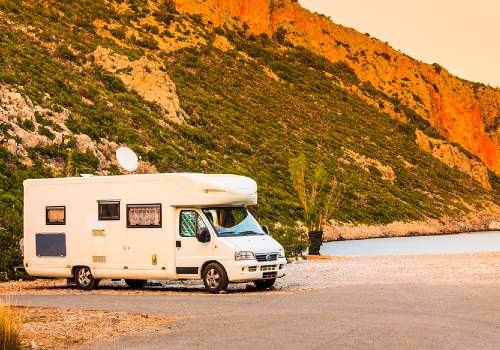
Watch the Tides
Once you hit the sand, take a walk along the shore. Make a mark of any obvious high-tide line and double-check local tide charts and times to ensure you don’t set up your tent or park your camper too close to the waterline.
Most high-tide lines will have a build-up of seaweed, driftwood, or darker sand that is easy to spot.
Tides will be higher during any new or full moon stages. We suggest you give yourself a large buffer zone from the high tide mark to avoid damaging your camping gear or having your RV get stuck in the sand or get flooded.
Keep a very close eye on the local weather as well. Big storms can kick up large waves that may have you scrambling to outrun them if you’re caught off guard.
Place Tent and RV in a Safe Location
Tenters should avoid setting up a tent in open sand, as the winds are stronger and can blow things away, plus you’ll have little privacy.
Look instead to pitch your tent close, but not on or in sand dunes, any tree or brush line, or large structure.
Use corkscrew-style stakes to get a better grip on the sand. Dig away any loose sand on the surface and start setting your stakes in the firm sand below.
RVers without a four-wheel-drive off-road camper will need to stick to the firm ground when parking. Recreational vehicles are heavy and can quickly get bogged down in the sand, leaving you trapped until you call an expensive tow truck to pull you free.
Keep Sand on the Beach
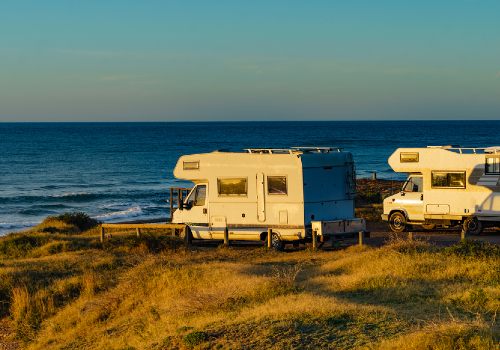
RVers will have a more comfortable beach camping setup, as it’s easier to avoid tracking sand everywhere, and you can use your freshwater holding tank, toilet, and shower during your stay and dump the wastewater at a station after you leave.
Both RVers and tenters should look into an outdoor shower to rinse off sand or dirt before entering their camper or tent. The showers are also great for washing pets.
Some outdoor showers are solar or are on-demand with a portable propane tank so you can have warm to hot water, which is a luxury you’ll appreciate!
Another good beach camping practice is to bring along a flat plastic tub to fill with water and leave it outside your tent or camper door. People can wash sand or dirt off their feet, step onto a dry towel, and bring less mess inside.
Keep a Fire Going
Beaches are notoriously windy, so if your location allows fires, you still may have trouble getting it to light and keep burning.
A trick is to dig a pit into the sand at least a foot deep. The sides will block the wind and contain your fire better than building it on top of the sand.
A pit fire is easier to control, and when you finish, you can remove the large chunks of wood and fill the hole to leave no trace.
Best Beach Camping Destinations
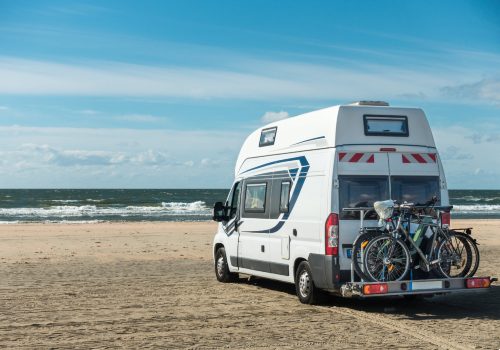
There are beach camping locations that dot the US coasts, but here are the top-rated destinations you should add to your bucket list:
Wright’s Beach – Sonoma County, California
This beach sits in Sonoma Coast State Park on Highway 1. There are 27 pet-friendly campsites for tenters to choose from.
Reservations can be made two days or up to six months in advance through the California Department of Parks and Recreation. Campsite rates start at $35 nightly.
Homer Spit Campground – Homer, Alaska
View mountains and ocean at this majestic campground along Kachemak Bay. There are sites for 100 RVs and 25 tents, which means you won’t be camping alone, but the views and wildlife are spectacular. You can also easily pop into town for restaurants or shopping.
You can choose from both beachfront or inland campsites that start at $30 nightly. Book your site at the Homer Spit Campground website.
Apostle Islands National Lakeshore – Lake Superior, Wisconsin
This beach campground location isn’t on the ocean, but it sure is stunning. The campsites are on 18 of the 21 Apostle Islands, with rates that start at $15 a night.
Make reservations 30 days in advance through the National Park Service Apostle Islands website.
Apostle Islands National Lakeshore (Video)
Sea Camp Campground – Cumberland Island National Seashore, Georgia
We think this campground is a hidden gem that brings history, nature, and tent camping together in a peaceful atmosphere only accessible by ferry. All of us have been here and returned for the pristine beach and wild horses.
Want to Connect With a Community of Over 1,078 RV Enthusiasts?
Make your reservation up to six months in advance through the National Park Service Sea Camp website. Camping fees start at $22 per night.
Kalaloch Campground – Olympic National Park, Washington
This rocky beach campground in Washington State is a bird and whale-watching paradise. The campground is popular, so book your site as early as possible so you don’t miss out.
Rates range from $24-$48 nightly, with reservations made through the National Park Service Kalaloch Campground website.
Cape Lookout National Seashore – Outer Banks, North Carolina
Pack your tent and enjoy camping solitude in this bare-bones campground that features amazing ocean views, encounters with wildlife (no worries — nothing scary), and wide stretches of sand.
You only need a permit to camp if your group has over 25 people, and you can get more information at the National Park Service Cape Lookout website. Vehicles that include any style of camping trailer, pop-up camper, truck bed camper, or rooftop camper are also welcome but must stay on the oceanside beach off the primary dunes.
Bahia Honda State Park – Big Pine Key, Florida
Everyone needs to visit the Keys at least once, right? Well, this beach camping destination is a great way to immerse yourself in clear, warm ocean waters to swim, float, snorkel, boat, and fish.
Reservations are made through the Florida State Parks, and rates start at $36 per night. Note: Due to Hurricane Irma, the camping sites are still under construction but are set to reopen.
Grand Isle State Park – Grand Isle, Louisiana
If you’re near New Orleans, you should check out this campground that’s about a two-hour drive away. The campground has sites right on the beach and abounds in bayou culture with fishing, hiking trails, and other water and outdoor activities to keep you busy.
There are 14 tent sites and 49 RV sites that offer power and water. Rates start at $18 nightly, and reservations can be made through Reserve America for Louisiana State Parks.
Assateague Island National Seashore – Assateague Island, Maryland
If you’re on the East Coast, consider stopping at this beach camping destination on a tiny island that sits between Chincoteague Bay and the Atlantic Ocean. The wild ponies that reside here are a treat to observe, along with the beautiful scenery.
Campsite rates start at $30 nightly, and you can reserve a spot through the National Park Service Assateague Island website.
Assateague Island – Beach and Camping (Video)
Bird Island Basin – Padre Island National Seashore, Texas
If you love to windsurf or kayak, this campground is a great place to stay. Along with spotting all types of birds, you can enjoy affordable campsites that are rustic (no power or water), but there are showers to keep you clean.
Camping fees are $8, with a 50% discount for seniors. Reservations can be made on the National Park Service Bird Island Basin website.
Horseneck Beach State Reservation – Westport, Massachusetts
West of Martha’s Vineyard sits a two-mile-long beach that offers wild scenery and 100 campsites for RVs and tents. The area is known for great windsurfing, but the cobblestone beach will have treasure hunters and beachcombers happy for hours.
Rates start at $22 per night for Massachusetts residents and $70 nightly for campers from out of state. To make a reservation, visit the park’s website and book through Reserve America.
Beach Camping Wrap-Up
Camping isn’t always about active RV resorts, serene BLM land out west, or wooded campsites in the heart of nature. Some of the most enjoyable getaways can be spent beach camping at any of the above favorites or by searching for locations closer to home.
We do hope you take the time to explore your beach camping options and use our guide to pack, prepare, and set up camp so your experience is stress-free. Knowing what to expect can reduce the chance of forgetting essential items and keep your traveling party safer.
We love beach camping and hope to see you out on the sand in your RV or tent soon!
"Man cannot discover new oceans unless he has the courage to lose sight of the shore."
-- Andre Gide

